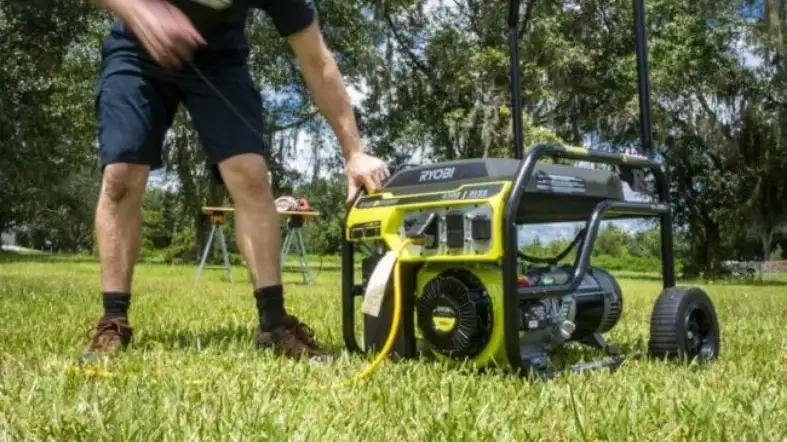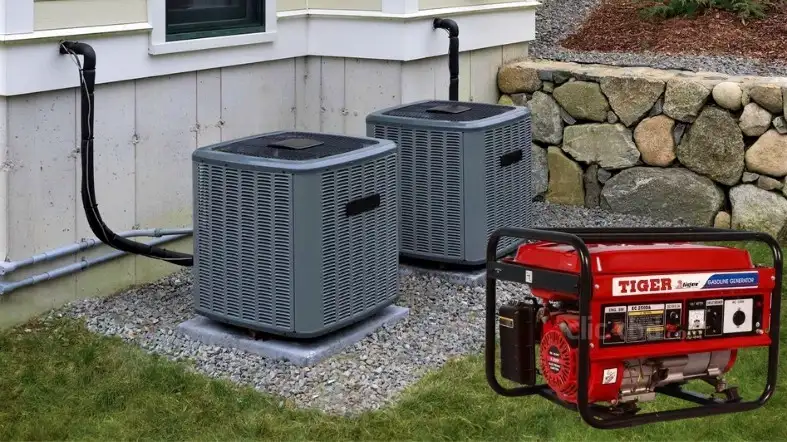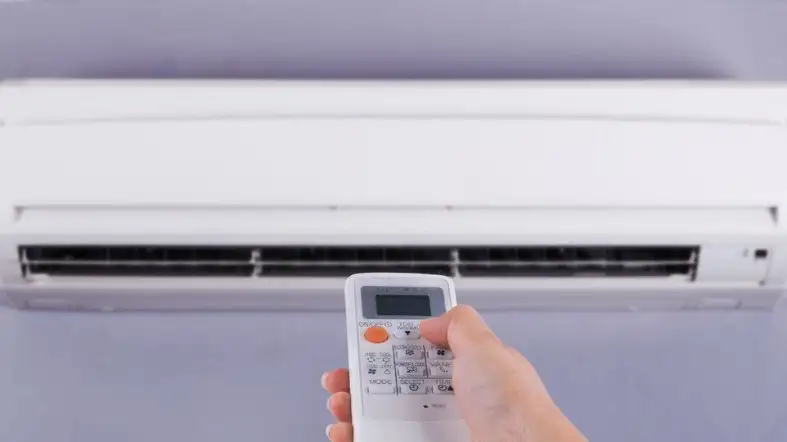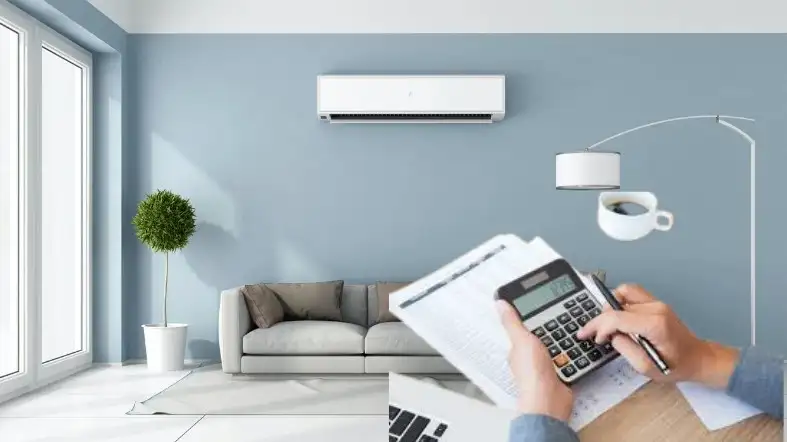Do you need a generator to run the air conditioner? A lot of people seem to think that you do, but the truth is that it depends on the size of the AC unit.
Below we’ll look at Will a 6500 watt generator run central air. So, keep reading to learn more!

Click Here To Check Recommended Generators
Will A 6500 Watt Generator Run Central Air
A 6500-watt generator may be able to run a central air conditioning system, but it depends on the size of the A/C unit. Total the starting and running watts for the air handler and condenser, and add other loads. If the total is significantly less than 6500 watts, the generator should power the system.
What Size Generator To Run Central Air Conditioner?
The size of the generator needs to run the central air conditioner will depend on the size of the AC unit.
For example, a small 5000 BTU air conditioner will only require about 1000 watts to run.
But a large 5-ton air conditioner can require up to 6000 watts. So, it just depends on the size of the AC unit.
Follow the below table for a more specific guide:
| Generator Watts | Central Ac Size |
|---|---|
| 6000 | 1.5 Ton |
| 8000 | 2 Ton |
| 12000 | 3 Ton |
| 15000 | 4 Ton |
| 18000 | 5 Ton |
How To Determine The Right Size Generator To Run A Central Air?

Running a central air conditioning system requires a lot of power, so it’s important to choose the right size generator to avoid overloading the system.
Here are the steps to determine the right size generator to run a central air:
Determine the starting and running wattage requirements
Check the central air conditioning system’s user manual or consult with an HVAC professional to determine the starting and running wattage requirements of the unit.
Calculate the surge wattage requirement
When a central air conditioning system starts, it requires more power than when it is running.
To determine the surge wattage requirement, multiply the running wattage by 3.
For example, if your central air requires 3000 running watts, you’ll need a generator that can provide at least 9000 surge watts.
>> What appliances can run on a 5000 watt generator?
Add up the wattage requirements of other appliances
Determine the wattage requirements of other appliances that will be running at the same time, such as lights, refrigerators, and TV, and add them to the central air’s wattage requirements.
Choose a generator with adequate power output
Choose a generator that has enough power output to meet the total wattage requirements of the central air and other appliances.
A good rule of thumb is to choose a generator with a power output that is 20% higher than the total wattage requirements.
>> What is the cost to have a standby generator installed?
Check the generator’s outlets
Make sure the generator has the appropriate outlets for the central air conditioning system.
Most central air systems use a 240-volt outlet, so check that the generator has one.
>> Do I qualify for a tax deduction for a whole house generator?
Consider the fuel type
Generators can run on gasoline, propane, or diesel. Choose a fuel type that is readily available and affordable in your area.
Consider noise level and portability
If you plan to use the generator in a residential area, consider a quieter model with noise-reducing features.
If you need to move the generator frequently, choose a portable model with wheels and a handle.
How To Calculate What Size Generator Will Need For Air Conditioner?
A few inconsiderate power-drawing devices around the house create significant problems during a blackout. Such as:
Appliances
When all appliances are turned on and working at once, they can use a large amount of power.
Heavier appliances like the fridge, washing machine, and geyser will cause the generator to shut down when you need it most.
We always recommend determining how much power you’ll need at the very least while selecting or looking for a generator.
Most people find out how much power they need to run their home, which can be rather revealing.
Space
Many people are shocked to learn that they can’t put their generator in the back corner of their lot.
You could have saved yourself a lot of money in fines by researching before installing the machine.
The minimum setback for a generator is usually 3m from any occupied building, but we recommend putting it further away if possible.
If you have the space, the best place for the generator is as far away from home as possible.
>>whole house generator size estimator
Air Conditioning

You’ll need to figure out how the air conditioning will function. You must make sure the generator is capable of running it.
You will already have an air conditioner in the house that cools it. We recommend finding an air conditioner with a high EER (energy efficiency rating).
These air conditioners are less expensive to operate and will save you money monthly on your power bills.
>> can a 9000 watt generator run a house?
Overall Usage
Many people forget to consider the power usage of everything in their homes. Most countries with persistent power outages have them in the winter.
But you will not require air conditioning during the summer. Besides, appliances like the fridge, oven, and lights will still need to be used.
We recommend getting a generator that is at least 50% more powerful than you think you’ll need to have some breathing room.
You can determine what appliances the generator will require to operate by researching when you’ll need it.
If you plan to use a generator year-round, keep in mind that you’ll need different appliances at different times of the year.
You’ll need air conditioners during warm weather and heaters during cold weather.
How To Calculate How Much Power An Air Conditioner?

To calculate how much power an air conditioner will use, you need to know its wattage and how many hours it will run.
Here are the steps to calculate the power usage of an air conditioner:
Determine the wattage of the air conditioner
Check the air conditioner’s user manual or label on the unit to find its wattage rating.
Determine the voltage of the air conditioner
Check the air conditioner’s user manual or label on the unit to find its voltage rating.
Calculate the amperage of the air conditioner
Divide the wattage by the voltage to find the amperage.
For example, if the air conditioner has a wattage rating of 1200 watts and a voltage rating of 120 volts, its amperage is 10 amps (1200/120=10).
>> How to join portable generator to house without transfer switch?
Determine the number of hours the air conditioner will run
Estimate how many hours the air conditioner will run per day or week during its usage period.
Multiply the amperage by the number of hours
Multiply the amperage by the number of hours the air conditioner will run to calculate the total amount of electricity it will use.
For example, if the air conditioner runs for 8 hours a day and has an amperage of 10 amps, it will use 80 amp-hours of electricity (10 x 8=80).
Convert the amp-hours to kilowatt-hours
Divide the amp-hours by 1000 to convert them to kilowatt-hours (kWh). For example, 80 amp-hours is equal to 0.08 kWh.
Calculate the electricity cost
Multiply the kWh by the cost per kWh charged by your utility company to calculate the cost of electricity used by the air conditioner.
Factors to Consider When Pairing a Generator with Central Air
Total Home Energy Consumption
Calculate the total running watts used by your home. Add up the rated watts for lights, appliances, A/C units, etc.
This determines the minimum generator capacity needed. Include essentials only – not all devices can run simultaneously.
Generator Capacity
Continuous Watts
The continuous or running watt rating must meet or exceed your total home power demands. This allows long-term operation.
Surge Watts
Surge watt rating covers start-up currents. Air conditioners require high starting watts before dropping to lower runtime. Select at least 30% more surge than continuous watts.
Fuel Type and Efficiency
Compare gas vs diesel vs propane generators on noise, runtime, fuel storage and cost. Lean towards more efficient and cost-effective fuel options for your runtime needs.
Location and Ventilation
Generator location impacts noise muffling and air intake needs. Ensure open ventilation if placing in garage or enclosed areas. Locate away from A/C system air intake.
Noise Levels
Larger generators produce more noise. Soundproofing and locating away from living areas helps reduce noise disturbances. Compare decibel ratings before purchasing.
Maintenance Requirements
Follow all maintenance procedures to ensure reliable starting and power delivery. Test run the generator monthly under load. Check fuel, oil, filters regularly.
Weather and Environmental Factors
Temperature extremes, humidity, dirt and debris can impact generator operation and lifespan. Protect from elements with shelters and enclosures.
Safety Features
Select generators with automatic shut-offs, overload protection, CO monitors, GFCI outlets, stable bases and grounding. This prevents hazards.
Cost and Budget Considerations
Generator costs vary widely based on capacity and features. Balance upfront price with value, longevity and essential requirements.
Local Codes and Regulations
Check building codes for any generator restrictions or permit/inspection needs. Ensure proper installation and operation.
FAQs on if A 6500 Watt Generator will Run Central Air
What happens if the generator is not powerful enough to run the central air unit?
The generator may fail to start the central air unit, or it may not be able to provide enough power to keep the unit running.
This can lead to damage to the central air unit and the generator.
Can I run other appliances with a 6500 watt generator while running central air?
It depends on the total power requirement of the central air unit and other appliances.
You may need to calculate the total power requirement and ensure that it does not exceed the capacity of the generator.
What is the fuel efficiency of a 6500 watt generator?
Fuel efficiency varies depending on the specific model and manufacturer.
Some 6500 watt generators are designed to be fuel efficient, while others may consume more fuel.
It is important to check the fuel consumption rate before purchasing a generator.
Can I use a 6500 watt generator for other purposes besides running central air?
Yes, a 6500 watt generator can power a variety of appliances and tools, such as refrigerators, freezers, sump pumps, power tools, and lighting.
You need to ensure that the total power requirement does not exceed the capacity of the generator.
Final Thoughts
A 6500 watt generator can run central air, but it depends on the power requirement of the specific central air unit.
It is important to determine the power requirement of the central air unit before choosing a generator and to ensure that the total power requirement of all appliances does not exceed the capacity of the generator.
